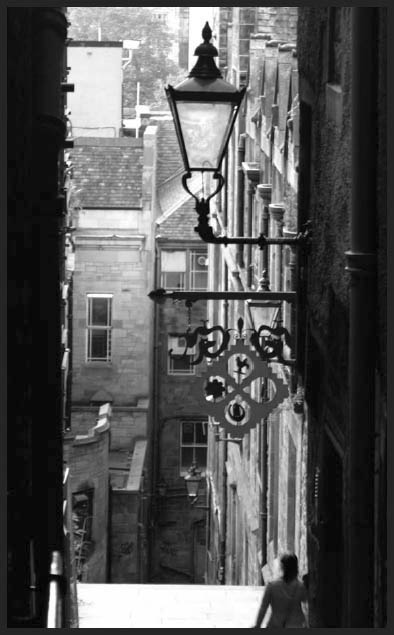The Black Book (39 page)
Authors: Ian Rankin

Rebus and Kintoul were silent, blood pounding through them, both trying to cope with the vision of an early morning pigsty … ‘Afterwards,’ said Kintoul, his voice lower than ever, ‘he beamed at us like it was his coronation.’
Then, in complete grimacing silence, he started to weep.
Rebus was visiting the Infirmary so often he was considering taking out a season ticket. But he hadn’t expected to see Flower there.
‘Checking in? The psychiatric section’s down the hall.’
‘Ha ha,’ said Flower.
‘What are you doing here anyway?’
‘I could ask you the same question.’
‘I live here, what about you?’
‘I came to ask some questions.’
‘Of Andrew McPhail?’ Flower nodded. ‘Did nobody tell you his jaw’s wired shut?’ Flower twitched, producing a good wide grin from Rebus. ‘How come it’s your business anyway?’
‘It involves Cafferty,’ Flower said.
‘Oh aye, so it does, I’d forgotten.’
‘Looks like we’ve got him this time.’
‘Looks like it. But you never know with Cafferty.’ Rebus stared unblinking at Flower as he spoke. ‘The reason he’s lasted so long is he’s clever. He’s clever, and he’s got the best lawyers. Plus he’s got people scared of him, and he’s got people in his pocket … maybe even a copper or three.’
Flower had stared out the gaze; now he blinked. ‘You think I was in Cafferty’s pocket?’
Rebus had been pondering this. He had Cafferty marked down for the attack on Michael and the scam with the gun. As for the clumsy hit-and-run attempt, that was so amateurish, he guessed at Broderick Gibson for its architect. Quite simply, Cafferty would have used better men.
He’d been silent long enough, so he shook his head. ‘I don’t think you’re that smart. Cafferty likes smart people. But I
do
think you had a word with the Inland Revenue about me.’
‘I don’t know what you’re talking about.’
Rebus grinned. ‘I do like a cliché.’ Then he walked on down the hall.
Andrew McPhail was easy to find. You just looked for the broken face. He was wired up like somebody’s first attempt at a junction box. Rebus thought he could see where they’d used two wires where one would have sufficed. But then he was no doctor. McPhail had his eyes closed.
‘Hello there,’ said Rebus. The eyes opened. There was anger there, but Rebus could cope with it. He held up a hand. ‘No,’ he said, ‘don’t bother to thank me.’ Then he smiled. ‘It’s all set up for when they let you out. Up north for rehabilitation, maybe a job, and bracing coastal walks. Man, I envy you.’ He looked around the ward. Every bed had a body in it. The nurses looked like they could use a holiday or at the very least a gin and lime with some dry-roast peanuts.
‘I said I’d leave you alone,’ Rebus went on, ‘and I keep my word. But a piece of advice.’ He rested his hands on the edge of the bed and leaned towards McPhail. ‘Cafferty’s the biggest villain in town. You’re probably the only bugger in Edinburgh who didn’t know that. Now his men know a guy called McPhail set their boss up. So don’t ever think of coming back, will you?’ McPhail still glared at him. ‘Good,’ said Rebus. He straightened up, turned, and walked away, then paused and turned. ‘Oh,’ he said, ‘and I meant to say something.’ He returned to the bed and stood at its foot, where charts showed McPhail’s temperature and medicaments. Rebus waited till McPhail’s wet eyes were on his, then he smiled sympathetically again.
‘Sorry,’ he said. This time, when he turned he kept on walking.
Andy Steele had been the necessary go-between. It was too dangerous for Rebus to put the story out first-hand. The source of the tale might have got back to Cafferty, and that would have ruined everything. McPhail hadn’t been necessary, but he’d been useful. Rebus explained the ruse twice to Andy Steele, and even then the young fisherman didn’t seem to take it all in. He had the look of a man with a dozen unaskable questions.
‘So what are you going to do now?’ Rebus asked. He’d been hoping in fact that Steele might already have left for home.
‘Oh, I’m applying for a grant,’ said Steele.
‘You mean like university?’
But Steele hooted. ‘Not likely! It’s one of those schemes to get the unemployed into business.’
‘Oh aye?’
Steele nodded. ‘I’m eligible.’
‘So what’s the business?’
‘A detective agency, of course!’
‘Where exactly?’
‘Edinburgh. I’ve made more money since I came here than I made in six months in Aberdeen.’
‘You cannot be serious,’ said Rebus. But Andy Steele was.
He had one last meeting planned, and wasn’t looking forward to it. He walked from St Leonard’s to the University library at George Square. The indifferent security man on the door glanced at his ID and nodded him towards the front desk, where Nell Stapleton, tall and broad-shouldered, was taking returned books from a duffel-coated student. She caught his eye and looked surprised. Pleased at first; but as she went through the books, Rebus saw her mind wasn’t wholly on the job. At last, she came over to him.
‘Hello, John.’
‘Nell.’
‘What brings you here?’
‘Can we have a word?’
She checked with the other assistant that it was okay to take a five-minute break. They walked as far as a book-lined corridor.
‘Brian tells me you’ve closed the case, the one he was so worried about.’
Rebus nodded.
‘That’s great news. Thanks for your help.’
Rebus shrugged.
She tilted her head slightly. ‘Is something the matter?’
‘I’m not sure,’ said Rebus. ‘Do you want to tell me?’
‘
Me?
’
Rebus nodded again.
‘I don’t understand.’
‘You’ve lived with a policeman, Nell. You know we deal in motives. Sometimes there isn’t much else to go on. I’ve been thinking about motives recently.’ He shut up as a female student pulled open a door, came out into the corridor, smiled briefly at Nell, and went on her way. Nell watched her go. Rebus thought she would like to swop bodies for a few minutes.
‘Motives?’ she said. She was leaning against the wall, but Rebus got no notion of calmness from her stance.
‘Remember,’ he said, ‘that night in the hospital, the night Brian was attacked. You said something about an argument, and him going off to the Heartbreak Cafe?’
She nodded. ‘That’s right. We met that night to talk over a drink. But we argued. I don’t see –’
‘Only, I’ve been thinking about the motive behind the attack. There were too many at first, but I’ve narrowed them down. They’re all motives
you’d
have, Nell.’
‘What?’
‘You told me you were scared for him, scared because
he
was scared. And he was scared because he was poking into something that could nail Big Ger Cafferty. Wouldn’t it be better if there was
another
body on the case, someone else to attract the fire? Me, in other words. So you got me involved.’
‘Now wait a minute –’
But Rebus held his hand up and closed his eyes, begging silence. ‘Then,’ he said, ‘there was DC Clarke. They were getting along so famously together. Jealousy maybe? Always a good motive.’
‘I don’t believe this.’
Rebus ignored her. ‘And of course the simplest motive. The two of you had been rowing about whether or not to have kids. That and the fact that he was overworking, not paying you enough attention.’
‘Did he tell you that?’
Rebus did not sound unkind. ‘You told me yourself you’d had a row that evening. You knew where he was headed – same place as always. So why not wait near his car and brain him when he came out? A nice simple revenge.’ Rebus paused. ‘How many motives does that make? I’ve lost count. Enough to be going on with, eh?’
‘I don’t believe this.’ Tears were rising into her eyes. Every time she blinked, more appeared. She ran a thumb and forefinger down her nose, clearing it, breathing in noisily. ‘What are you going to do?’ she asked at last.
‘I’m going to lend you a hankie,’ said Rebus.
‘I don’t want your fucking hankie!’
Rebus put a finger to his lips. ‘This is a library, remember?’
She sniffed and wiped away tears.
‘Nell,’ he said quietly, ‘I don’t want you to say anything. I don’t want to know. I just want
you
to know. All right?’
‘You think you’re so fucking smart.’
He shrugged. ‘The offer of a hankie still stands.’
‘Get stuffed.’
‘Do you really want Brian to leave the force?’
But she was walking away from him, head held high, shoulders swinging just a little exaggeratedly. He watched her go behind the desk, where her co-worker saw something was wrong and put a comforting arm around her. Rebus examined the shelves of books in front of him in the corridor, but saw nothing to delay his leavetaking.
He sat on a bench in the Meadows, the back of the library rising up behind him. He had his hands in his pockets as he watched a hastily arranged game of football. Eight men against seven. They’d come over to him and asked if he fancied making up the numbers.
‘You must be desperate,’ he’d said, shaking his head. The goalposts comprised one orange and white traffic cone, one pile of coats, one pile of folders and books, and a branch stuck in the ground. Rebus glanced at his watch more often than necessary. No one on the field was worrying too much about the time taken to play the first half. Two of the players looked like brothers though they played on opposing sides. Mickey had left the flat that morning, taking the photo of their dad and Uncle Jimmy with him.
‘To remind me,’ he’d said.
A woman in a Burberry trenchcoat sat down on the bench beside him.
‘Are they any good?’ she asked.
‘They’d give Hibs a run for their money.’
‘How good does that make them?’ she asked.
Rebus turned towards Dr Patience Aitken and smiled, reaching out to take her hand in his. ‘What kept you so long?’ he asked.
‘Just the usual,’ she said. ‘Work.’
‘I tried phoning you so often.’
‘Put my mind at rest then,’ she said.
‘How?’
She moved closer. ‘Tell me I’m not just a number in your little black book …’

 ©Rankin
©RankinABOUT IAN RANKIN
Ian Rankin, OBE, writes a huge proportion of all the crime novels sold in the UK and has won numerous prizes, including in 2005 the Crime Writers’ Association Diamond Dagger. His work is available in over 30 languages, home sales of his books exceed one million copies a year, and several of the novels based around the character of Detective Inspector Rebus – his name meaning ‘enigmatic puzzle’ – have been successfully transferred to television.
 Introduction to DI John Rebus
Introduction to DI John RebusThe first novels to feature Rebus, a flawed but resolutely humane detective, were not an overnight sensation, and success took time to arrive. But the wait became a period that allowed Ian Rankin to come of age as a writer, and to develop Rebus into a thoroughly believable, flesh-and-blood character straddling both industrial and post-industrial Scotland; a gritty yet perceptive man coping with his own demons. As Rebus struggled to keep his relationship with daughter Sammy alive following his divorce, and to cope with the imprisonment of brother Michael, while all the time trying to strike a blow for morality against a fearsome array of sinners (some justified and some not), readers began to respond in their droves. Fans admired Ian Rankin’s re-creation of a picture-postcard Edinburgh with a vicious tooth-and-claw underbelly just a heartbeat away, his believable but at the same time complex plots and, best of all, Rebus as a conflicted man trying always to solve the unsolvable, and to do the right thing.
